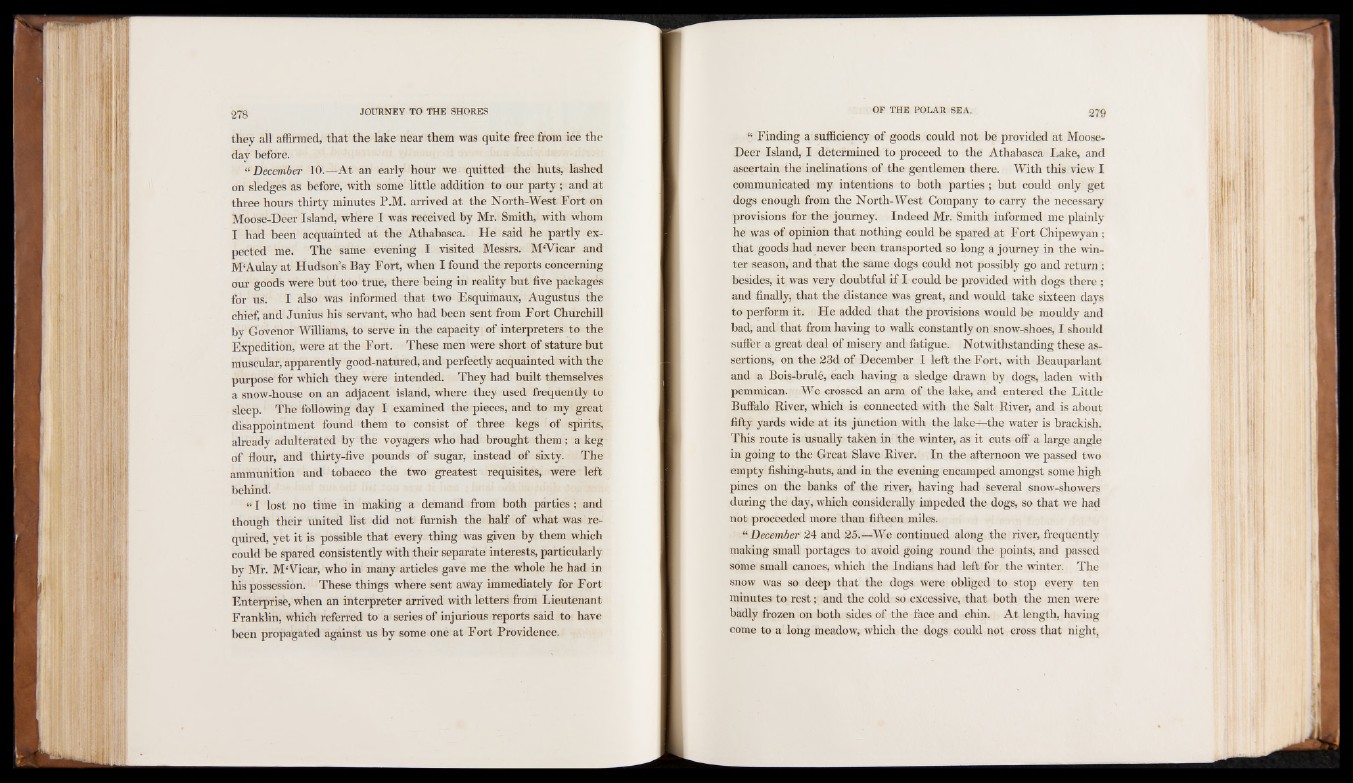
they all affirmed, that the lake near them was quite free from ice the
day before.
“ December 10.—At an early hour we quitted the huts, lashed
on sledges as before, with some little addition to our party ; and at
three hours thirty minutes P.M. arrived at the North-West Fort on
Moose-Deer Island, where I was received by Mr. Smith, with whom
I had been acquainted at the Athabasca. He said he partly expected
me. The same evening I visited Messrs. M'Vicar and
M'Aulay at Hudson’s Bay Fort, when I found the reports concerning
our goods were but too true, there being in reality but five packages
for us. I also was informed that two Esquimaux, Augustus the
chief, and Junius his servant, who had been sent from Fort Churchill
by Govenor Williams, to serve in the capacity of interpreters to the
Expedition, were at the Fort. These men were short of stature but
muscular, apparently good-natured, and perfectly acquainted with the
purpose for which they were intended. They had built themselves
a snow-house on an adjacent island, where they used frequently to
sleep. The following day I examined the pieces, and to my great
disappointment found them to consist of three kegs of spirits,
already adulterated by the voyagers who had brought them ; a keg
of flour, and thirty-five pounds of sugar, instead of sixty. The
ammunition and tobacco the two greatest requisites, were left
behind.
“ I lost no time in making a demand from both parties; and
though their united list did not furnish the half of what was required,
yet it is possible that every thing was given by them which
could be spared consistently with their separate interests, particularly
by Mr. M‘Vicar, who in many articles gave me the whole he had in
his possession. These things where sent away immediately for Fort
Enterprise, when an interpreter arrived with letters from Lieutenant
Franklin, which referred to a series of injurious reports said to have
been propagated against us by some one at Fort Providence.
“ Finding a sufficiency of goods could not be provided at Moose-
Deer Island, I determined to proceed to the Athabasca Lake, and
ascertain the inclinations of the gentlemen there. With this view I
communicated my intentions to both parties ; but could only get
dogs enough from the North-West Company to carry the necessary
provisions for the journey. Indeed Mr. Smith informed me plainly
he was of opinion that nothing could be spared, at Fort Chipewyan ;
that goods had never been transported so long a journey in the winter
season, and that the same dogs could not possibly go and return ;
besides, it was very doubtful if I could be provided with dogs there ;
and finally, that the distance was great, and would take sixteen days
to perform it. He added that the provisions would be mouldy and
bad, and that from having to walk constantly on snow-shoes, I should
suffer a great deal of misery and fatigue. Notwithstanding these assertions,
on the 23d of December I left the Fort, with Beauparlant
and a Bois-brul6, each having a sledge drawn by dogs, laden with
pemmican. We crossed an arm of the lake, and entered the Little
Buffalo River, which is connected with the Salt River, and is about
fifty yards wide at its junction with the lake—the water is brackish.
This route is usually taken in the winter, as it cuts off a large angle
in going to the Great Slave River. In the afternoon we passed two
empty fishing-huts, and in the evening encamped amongst some high
pines on the banks of the river, having had several snow-showers
during the day, which considerally impeded the dogs, so that we had
not proceeded more than fifteen miles.
“ December 24 and 25.—We continued along the river, frequently
making small portages to avoid going round the points, and passed
some small canoes, which the Indians had left for the winter. The
snow was so deep that the dogs were obliged to stop every ten
minutes to rest; and the cold so excessive, that both the men were
badly frozen on both sides of the face and chin. At length, having
come to a long meadow, which the dogs could not cross that night,